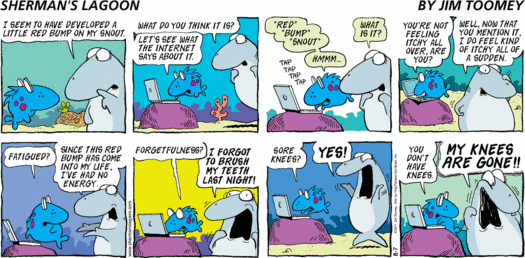September 11th, 2011 by RyanDuBosar in Research
No Comments »

Nearly three-quarters of survey respondents said they look up information online in front of a patient sometimes or often, and another 11% said they do when absolutely needed. Only 13% deliberately avoid it.
ACP Internist polled its readers in relation to its story on computers in medicine, in which it focused on whether doctors should look up information in front of a patient. From this, 362 readers responded in August that: Read more »
*This blog post was originally published at ACP Internist*
August 16th, 2011 by DavedeBronkart in Opinion
No Comments »

An SPM member emailed this, with the playful subject line “A New e-Patient”:

(Click the image to go to the high-res on the comic’s site; © Copyright 2011 King Features Syndicate, all rights reserved.)
Funny comic, but it’s a common misconception that “e-patient” = anyone who googles (or bings, or webmd’s, or…). Wrong. E-patients are empowered, engaged, educated etc – not mindless, and not likely to freak out at the first thing they read.
When you search Read more »
*This blog post was originally published at e-Patients.net*
August 15th, 2011 by Lucy Hornstein, M.D. in Opinion
No Comments »

Seven months into 2011, things look very different than they did this time last year at my office. Not only have I been using an electronic medical record for nine months now, but I’ve also been submitting claims electronically (through a free clearinghouse) using an online practice management system. I’ve also begun scanning patients’ insurance cards into the computer, as well as converting all the paper insurance Explanation of Benefits (EOBs) into digital form. I’ve even scanned all my office bills and business paperwork and tossed all the actual paper into one big box. As of the first of the year I even stopped generating “daysheets” at the end of work each day. After all, with my new system I can always call up the information I want whenever I need it.
How did such a committed papyrophile get to this point? It is the culmination of a process that actually began last summer with the purchase of an adorable refurbished little desktop scanner from Woot ($79.99, retails for $199, such a deal!) The organizational software is useless for my purposes, but it does generate OCR PDFs, which makes copying and pasting ID numbers from insurance cards into wherever else they need to be a piece of proverbial cake. The first step was to start Read more »
*This blog post was originally published at Musings of a Dinosaur*
August 15th, 2011 by Berci in Opinion
No Comments »

Recently, I’ve had an interview with a national newspaper and the woman who performed the interview told me she was surprised that I seemed to be the first doctor in her life who was happy about patients using the internet. Well, she surprised me with this statement as I’ve never thought about that before. But she must be right. There are many doctors who get upset when they find out the patient tried to find information online. They are frustrated as they don’t even know how to use these online tools and have no idea how to help the patients in this perspective.
Myself, I’m pretty much happy about it. I love to hear patients Read more »
*This blog post was originally published at ScienceRoll*
July 26th, 2011 by Bryan Vartabedian, M.D. in Opinion
No Comments »

I can’t help but think that as time passes we’ll forget about how much medicine has changed with the introduction of the Internet. We’re witnessing a transition that hasn’t been seen in generations. We live with the end result but the memory of how we got here is fading quickly. Like any kind of cultural shift, once we’ve arrived it’s hard to remember what it was like along the way.
How did patients think before the information revolution? And how did it go down when patients began to search? How specifically did information clash with the old model of doctor and patient and how did we deal with it? There are stories here that need to be told. I think the real stories are in the small details of what went down between doctors and patients. But as early adopters, most of us spend our time looking forward, not back. Read more »
*This blog post was originally published at 33 Charts*
















